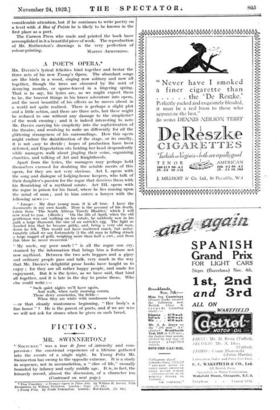A POET'S OPERA.
MR. DAVIES'S lyrical felicities bind together and bestar the three acts of his new Tramp's Opera. The abundant songs are like birds in a wood, singing now solitary and now all
together, though the trees are obscured by the mist of decaying months, or sparse-leaved in a lingering spring. That is to say, his lyrics are, as we might expect them to be, the bravest things in his brave adventure into opera, and the most beautiful of his effects as he moves about in a world not quite realized. There is perhaps a slight plot and a little action, and there are three acts, but these might be reduced to one without any damage to the simplicities of the work ensuing ; and it is indeed interesting to note Mr. Davies carrying his simplicity into the sophistication of the theatre, and resolving to write no differently for all the glittering strangeness of his surroundings. How this opera might endure the daintification of the stage, or its cruelty, it is not easy to decide ; hopes of production have been deferred, and Expectation sits holding her head despondently while managers walk about jingling their coins, organizing charities, and talking of Art and Knighthoods.
Apart from the lyrics, the managers may perhaps hold themselves excused for doubting the actable merits of this opera, for they are not very obvious. Act I. opens with the song and dialogue of lodging-house keepers, who talk of their daughter's passion for the rogue that deceives them with his flourishing of a mythical estate. Act III. opens with the rogue in prison for his fraud, where he lies musing upon the mind of man ; and to him enters a lawyer with the following news :—
" Lawyer : My dear young man, it is all true. I have the documents in my own hands. Here is the account of his death, taken from ` The South African Timely Bladder,' which I will now read to you. (Reads.) ' On the 5th of April, when the old gentleman was out walking on his estate, he suddenly saw in his path a large diamond, the size of an ostrich's egg. The light so dazzled him that he became giddy, and, being a very old man, down he fell. This would not have mattered much, but unfor- tunately (shall we say fortunately ?) the old man in falling struck a large nugget of gold, weighing more than half a cwt., and from this blow he never recovered.' " " My uncle, my poor uncle !" is all the rogue can cry, stunned by the information that brings him a fortune not now mythical. Between the two acts beggars and a gipsy
and ordinary people pass and talk, very much in the way that Mr. Davies's delightful prose books have taught us to enjoy ; for they are all rather happy people, and made for enjoyment. But it is the lyrics, as we have said, that bind all together, and it is late in the day to praise these. Who else could write
Such quiet nights we'll have again, And walk, when early morning comes, Those dewy cemeteries, the fields—
When they are white with mushroom tombs
—or that cleanly wantonness beginning, " Her body's a fine house " ? He is the purest of poets, and if we are wise we will not ask for stones when lie gives us such bread.


















































 Previous page
Previous page